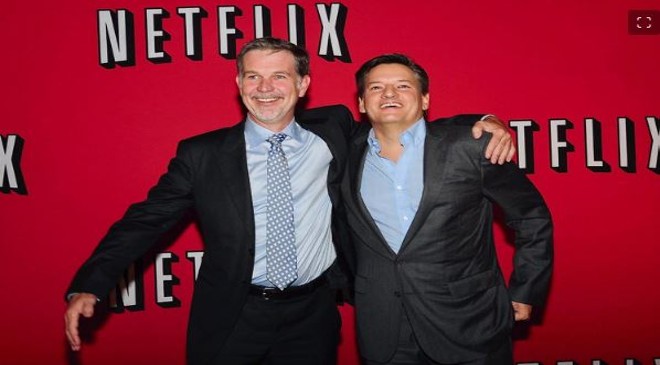- Netflix took jabs at competitors and defended its strategies with Tuesday’s earnings report.
- It avoided a third straight quarter of subscriber losses, and seems bullish on the future.
- It was enough for executives to take a victory lap.
Netflix seemed to turn a corner on Tuesday.
A new, more emboldened Netflix emerged as the company reported strong third-quarter earnings results.
The streaming company gained over 2 million subscribers — avoiding the third straight quarter of subscriber losses. It’s bullish about the future, too, and projected that it will add another 4.5 million subscribers in Q4.
The results appear to have been enough for Netflix to take a victory lap. The company took jabs at competitors’ spending and content in its letter to investors, and defended binge-watching, which it popularized by dropping full seasons of TV shows at once.
Executives were joyful in their earnings interview. Co-CEO Reed Hastings exclaimed, “Thank God we’re done with shrinking quarters!”
Critics may argue that it’s too early for such jubilation. After all, Netflix is coming off of six months of slowing growth and heavy layoffs. Its Q3 subscriber additions were still below the gains of other recent quarters, when it was growing rapidly.
But on Tuesday, the company appeared to send a signal to the haters: We know what we’re doing.
“Our competitors are investing heavily to drive subscribers and engagement, but building a large, successful streaming business is hard,” the company’s earnings letter said. “We estimate they are all losing money, with combined 2022 operating losses well over $10 billion, vs. Netflix’s $5 to $6 billion annual operating profit.”
“Our competitors are investing heavily to drive subscribers and engagement, but building a large, successful streaming business is hard,” the company’s earnings letter said. “We estimate they are all losing money, with combined 2022 operating losses well over $10 billion, vs. Netflix’s $5 to $6 billion annual operating profit.”

The company also threw shade at HBO’s “House of the Dragon” and Amazon’s “Lord of the Rings: The Rings of Power.”
Both shows are big-budget fantasy hits, but in its letter, Netflix shared a Google Trends chart showing its true-crime drama “Dahmer” topping both of them in interest after it debuted last month (although, it didn’t tell the full picture).
The company used the success of “Dahmer” to defend its binge-watch model, as competitors stick to traditional weekly releases.
“We think our bingeable release model helps drive substantial engagement, especially for newer titles,” it said in its letter.
And during the earnings interview, co-CEO and content chief Ted Sarandos shut down any debate over whether Netflix would expand its theatrical strategy, despite a previous Bloomberg report that it was considering giving some movies longer theatrical windows.\
“We’re in the business of entertaining our members with Netflix movies on Netflix,” he said. “There’s no question internally that we make movies for our members.”
While the company is putting its “Knives Out” sequel “Glass Onion” in the three major theater chains for the first time this year, it will still only play for one week in just 600 theaters, a month ahead of its streaming debut.
“Most people will watch it on Netflix,” Sarandos said regarding the movie, adding that “most people watch most movies at home.”

In other words, Netflix is doubling down on what it thinks it does best.
That’s not to say that the company isn’t trying new things. It’s introducing a cheaper ad-supported tier next month, something it had pushed back on previously. It’s starting to crack down on password sharing, and will begin charging for each additional account. And it intends to expand its video-game offerings, with new titles and a jump into cloud gaming.
But those could be seen as inevitable next steps rather than meaningful compromise or admission that its core strategies aren’t working.
Instead, the company is urging investors to rethink how they perceive Netflix’s success, focusing on revenue as its “primary top line metric” rather than paid subscribers. It will stop providing membership guidance in future earnings reports.
Sarandos said that he believes the “future of movies, of television, and of games is streaming.”
In other words, Netflix continues to think that the future of entertainment is still, undeniably, Netflix.



































